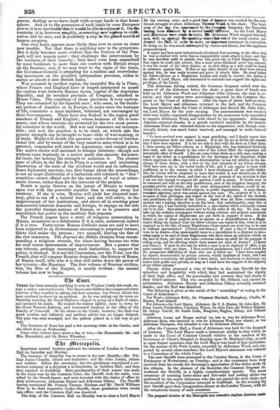The foreign news is various, and not without a minor
degree of interest.
There are no prominent events in France, except a run upon the Paris Savings-bank ; but speculation is rife. Some of the Opposition papers endeavour to interpret the recent elections as a " check" to Ministers, because one Ultra-Conservative elected has signed a declaration to oppose some parts of the Ministerial policy, and two Opposition Deputies have been elected. M. de Belleyme, the Conservative, opposed Ministers as a candidate for the Presidency of the Chamber; so his defection can scarcely be counted as anything. The attempt, indeed, to make something significant out of these elections, shows how little there is at present for the busy spirits of Paris to work upon. In the ab- sence of topics nearer home, the speculators turn to Algeria, and the question of Marshal Bugeaua's being-superseded or main- tained in his iron rule; to Madagascar, and an expedition to esta- blish French sovereignty. Madagascar, indeed, is likely enough to be seized by France. Had England bestirred herself years ago, in the time of Radama, that magnificent island might by this time have been redeemed from the savages and annexed to Mauritius ; even more recently, had we sooner interfered to protect British interests, the exm-eise, of energy might have been not unprofitable ; but we lathe time aa. slip by, and have unquestionably allowed the French to t t the start of us : as indeed she has throughout the ultra=. can group. We can scarce object to the French occupation of gascar, dealing as we have dealt with savage lands in that hemi- sphere. And as to the possession of such lands by some European power, it is so inevitable that it would be idletsrepunsat. it. Oa the contrary, it is, however roughly, eonverting.mew regime to civali- zation and its uses, and is positively a step is the grand march of human progress.
Our own India appears more likely than ever to cause us some new trouble. Not that there is anything new in the symptoms. But it daily becomes more evident that the Natives of the Pun- jaub will not remain quiet : they challenge the intervention by the loudness of their anarchy; they have even been committed by some borderers to more than one contest with British troops on the frontier ; and, if we may trust to the signs of the times, the Governor-General is preparing for a sudden and overwhelm- ing movement on the so-called independent province, either to coerce or absorb it into British India.
War resounds in another region, the beautiful Rio de la Plata; where France and England have at length interposed to quash the endless wars between Buenos Ayres, capital of the Argentine Republic, and its revolted province Of Uruguay, attached to Monte Video. The condition of those provinces is very curious. They are colonized by the Spanish race ' - who seem, in the South- ern portion of America as in Europe, to make arms the business of life, commerce a mere incident, tolerated, not encouraged by their Governments. There have also flocked to the region great numbers of French and English ; whose business of life is com- merce, and whose interests are protected by the two most power- ful countries in the world. But war and commerce are incompa tible - and now the question is to be tried, on which side the greater strength can be brought to bear—that of war-making, or of trade. Might will decide the question : under favour of interna- tional law, and by means of the very resort to arms which is to be arrested, commerce will assert its supremacy, and compel peace. The native choice will succumb to foreign interests ; though not without some warranty in a native party also anxious for peace- ful trade, but lacking the strength to maintain it. The present state of affairs in the Rio de la Plata is a curious and interesting illustration of the state of the civilized world and its influences. Some diplomatic mystery, too, that hangs about the proceedings, is not an inapt illustration of a barbarism still tolerated in " free " countries—secret official acts for the interests of royal or aristo- cratic classes, rather than for the interests of the peoples. Doubt is again thrown on the intent of Mexico to venture upon war with the powerful republic that is eating away her territory. If she is wise, Mexico will yield her disputed terri- tory, glad to cut off a tainted limb ; and she will strive, in the improvement of her institutions and above all in erecting great commercial interests domestic and foreign, to engage on her side the powerful foreign nations of Europe' so as to preserve and consolidate her power in the territory that remains. The French papers have a story of religious persecution in Russia, monstrous as a fabrication if it is such, monstrous indeed if it is true. Forty-seven Roman Catholic nuns are said to have been subjected to an ill-treatment amounting to perpetual torture; thirty died under the process ; two escaped, leaving the fate a the rest unknown. The 102421141 des Debats abstains from recom- mending a religious crusade, the times having become too wise for such coarse instruments of improvement. But a power that can tolerate, perhaps encourage such barbarities, to support its French, is doomed. It is not the Caucasians, nor the Poles, nor the French, that will conquer Russian despotism: the history of Rome, of Russia itself, tells who it is that will strike down the power of her tyrants—the Russians. The that volume of Russian civiliza tion, the Rise of the Empire, is nearly written : the second volume has now to begin.



























 Previous page
Previous page